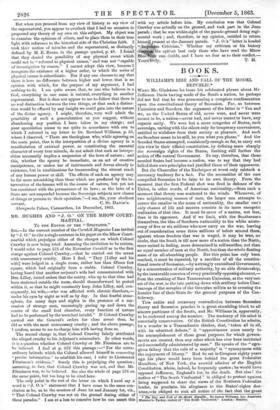MR. HUGHES AND " J. 0." ON THE MHOW COURT-
MARTIAL.
To THE EDITOR OF THE " SPECTATOR."
SIR,—In the current number of the Cornhill Magazine I am invited by " J. 0." to cite a single sentence in his paper on the Mhow Court- martial which prejudges either of the charges on which Colonel Crawley is now being tried. Assuming the invitation to be serious, I would refer to page 573 of the November Cornhill as to the first charge against Colonel Crawley,—that he carried out the arrest with unnecessary cruelty. Here I find, " They [Lilley and his wife] were lodged in a single room, rather less than fifteen feet square, which had originally been a stable. Colonel Crawley, having heard that another serjeant's wife had communicated with Mrs. Lilley, issued orders that the sentry, who up to that time had been stationed outside the room, should thenceforward be posted within it, so that he might constantly keep John Lilley, and, con- sequently, his wife,—who was afflicted with chronic diarrhcea,— under his eyes by night as well as by day. In that fearful atmo- sphere, for many days and nights in the presence of a suc- cession of strange men, unceasingly pacing up and down the centre of the small foul chamber, every function of nature had to be performed by the wretched invalid." If Colonel Crawley carried out the General's orders for close arrest thus, he did so with the most unnecessary cruelty ; and the above passage, I confess, seems to me to charge him with having done so.
The second charge is, that Colonel Crawley falsely attributed the alleged cruelty to his Adjutant's misconduct. In other words, it is a question whether Colonel Crawley or Mr. Fitzsimon are to be believed. 1 find at p. 572 this passage :—" For the extra- ordinary latitude which the Colonel allowed himself in concocting precise information' to establish his case, I refer to Lieutenant Fitzsimon's evidence." Surely this is prejudging the question ; assuming, in fact, that Colonel Crawley was not, and that Mr. Fitzsimon was, to be believed. See also the whole of page 576 on the same point, but too long to be cited here.
The only point in the rest of the letter on which I need say a word is "J. O.'s" statement that I have come to the same con- clusion as he, as to the musters of June 1st and January 1st, viz., " That Colonel Crawley was not on the ground during either of these parades." I am at a loss to conceive how he can assert this
with my article before him. My conclusion was that Colonel Crawley was actually on the ground, and took part in the June parade ; that he was within sight of the parade-ground doing regi- mental work ; and, therefore, in my opinion, entitled to return himself present at the January parade. " J. O.'s " letter is headed "Impul4ue Criticism." Whether my criticism or his history
d the epithet best only those who have read the Mhow Blue- can decide, and I have no fear as to their verdict.— T. H.






























 Previous page
Previous page